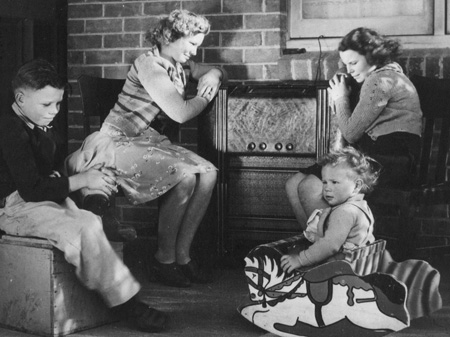 Most of the information you need to become ‘clued up’ on Integral Fast Reactor nuclear power is in written form of one sort of another: books, popular science articles, blog posts, and so on. But there’s plenty more out there. One fun way to get some ‘passive learning’ is to sit back and let your ears do the hard work. Below is a list of some radio interviews (and one TV slot) in which different people talk about fast reactors and related issues to do with Generation IV nuclear power:
Most of the information you need to become ‘clued up’ on Integral Fast Reactor nuclear power is in written form of one sort of another: books, popular science articles, blog posts, and so on. But there’s plenty more out there. One fun way to get some ‘passive learning’ is to sit back and let your ears do the hard work. Below is a list of some radio interviews (and one TV slot) in which different people talk about fast reactors and related issues to do with Generation IV nuclear power:
1. Tom Blees was interviewed by George Noory on Coast to Coast AM radio for the last 2 hours of the show in January 2009. Tom discussed how IFRs burns nuclear waste as fuel, and why this technology has the potential to provide unlimited energy. It’s a completely clean and safe energy source that could put coal and fossil fuel out of business, he declared. Tom also got a 50 minute gig on Douglas Everett’s Radio Parallax in February 2009 (audio here). Another interview is here.
2. Rod Adams, who runs the Atomic Insights blog, has recently interviewed George Stanford (Stanford earned his PhD in experimental nuclear physics from Yale University and then spent his professional career doing nuclear reactor safety research at the Argonne National Laboratory: he talks about sodium-cooled fast reactors and pyroprocessing.), Clinton Bastin (Bastin is an atomic pioneer who worked on used fuel recycling for most of his 42 year career. He has some strong opinions to share about related technologies.) and Steve Kirsch (Two years ago, Kirsch, a Silicon Valley entrepreneur and philanthropist, was sure that the US did not need nuclear power. Now he thinks it can save the planet. Find out what changed his mind.).
3. James Hansen was interviewed (TV) by Charlies Rose, where he says humanity should look forward to using 4th generation nuclear reactors. Ray Lightning has a post about it here, with links to the video.
4. Mark Lynas is confronted on BBC Radio 4: Today by Greenpeace’s Caroline Lucas for saying that nuclear power must be part of the 21st century energy solution. Lynas puts it as follows: On Radio 4′s Today programme, Green party leader Caroline Lucas accused me of having “lost the plot”. When I argued back, she accused me of “just being silly”. I was a traitor.

5. Finally, for some fireworks: Tom Blees was interviewed on The Peter B. Collins Show in November 2009, in a discussion that focused mostly on nuclear pros and cons. Harvey Wasserman, journalist, activist and author of Solartopia: Our Green-Powered Earth, joined in for the second half of the show. For extra points, count the number of times an increasingly heated Wasserman says “it’s just theoretical!“.
If you know of any other relevant interviews, please let us know in the comments below.
Whilst on this topic, I should also note that there is an excellent climate radio programme available for download as .MP3 files, called The 300 to 350 Show (named after Target CO2). It ran throughout 2008 as weekly 30 minute episodes. Its predecessor shows (Low Carbon Show [2007], Two Degrees [2006] and Climate Confidential [2005] are also archived at the linked site).
These three shows surveyed a diverse range of global-warming-related topics, and usually included interesting interviews with climate scientists, economists, activists and so on. Major events were regularly covered: for instance, this show focused on the Poznan climate conference from late 2008. It’s definitely worth checking out (and has been on my Climate Resources list [left sidebar] for quite some time).
Filed under: Nuclear






.png)
















Thanks to the wonders of RSS, my communte to work today was enlightened by the .mp3 of ‘Tom also got a 50 minute gig on Douglas Everett’s Radio Parallax’ (which was sitting on my ipod after its overnight charge).
This wonderful interview opened my eyes (ok ears) to both the advances in IFR technologies and plasma recycling and led me back to this blog post of yours. I had skimmed over the earlier posts you refer to here, but the significance of these two things was lost to me amidst the noise of a busy day. Being stuck in the car with the audio automagically fed to my ipod was just what I needed.
Thank you!
Mike
Thanks for the feedback Mike! Climate Debate Daily also kindly linked to this post, which has resulted in a lot of recent new hits (and click-throughs to these interviews) — and therefore, I hope, to an increased awareness of the huge advantages offered by “Newclear” power.
I definitely think that audio is often the best way to get introduced to new ideas that might otherwise be overlooked or skimmed in our busy lives (one can follow up later with the text if interest is sparked).
As a head’s up, I’ve put up a new Page, which provides links to the top 10 most viewed and 10 most commented BNC posts:
http://bravenewclimate.com/top-ten-bnc-posts/
[…] second ‘Fast Reactor Radio‘ came to me courtesy of Professor Barry Brook and his most excellent BraveNewClimate blog. I […]
It is unfortunate that Tom Bless wrote his book at the moment that Kirk Sorensen and I were pulling the Molten Salt Reactor from obscurity in the form of the Liquid Fluoride Thorium Reactor. While the IFR shares some of the advantages of the LFTR, the LFTR is safer and the LFTR does not require a separate chemical processing facility in order to close the breeding cycle. Thus the operating cost of the LFTR would be significantly less than the cost of operating the IFR, Indeed I suspect that the R&D costs of bring the LFTR to serial production will be lower that the R&D costs of developing the IFR to serial production. R&D spending on the IFR exceeding R&D spending on MSR technology by a ratio of over 20 to 1, and arguably MSR/LFTR R&D is closer to producing a commercial product, than LMFBR/IFR R&D.
Finally because of its semplisity, modest materials input and limited labor requirements, the LFTR can be factory produced at a fractionof the price of IFRs. I wrote in Nuclear Green this morning:
[…] was posted on bravenewclimate.com Charles Barton said 29 April 2009 at 19.43 It is unfortunate that Tom Blees wrote his book at the […]
[…] your climate and energy education, I’ve already pointed to some useful multimedia sources for understanding more about fast reactor nuclear power. This post is to alert you to a similar non-textual resource which tackles the recycled […]
Here’s a great debate on “Nuclear Power, Climate Change and the Next 10 000 Years”. The protagonists – Ralph Cavanagh (Natural Resources Defense Counsel) and Peter Schwartz (Global Business Network) are well informed and genial, and there’s none of the usual red herrings and ideology about nuclear power. Metal cooled fast reactors and proliferation resistant fuel cycles get some discussion. The debate is run to a format that forces each speaker to intelligently engage the other’s ideas – very different to the Blees vs Wasserman “debate”. Nice and long at nearly two hours. Its from 2006 – long before nuclear power was on my radar.
iTunes link or mp3 download.
Here’s another one – the Mayor of San Francisco interviews Stewart Brand on his weekly radio interview show. (The Mayor of San Francisco has a weekly radio interview show! And its great radio!).
Brand is a US environmental icon who came out as a pro-nuke some years ago. The discussion around nukes starts about 7 minutes in. Nothing new to listeners of KBNC, but a good discussion nonetheless. Quote of the piece from Brand,
“With climate, the more people know, the more frightened they are. With nuclear, the more people know, the less frightened they are.”
iTunes link or mp3 download.
{Barry, there seems to be something broken with comments on this page – I get an error whenever I submit here, and it seems to be something to do with the flickr image server.}
John, it seems the iTunes and mp3 links cause the message to get directed to the spam tray (which I always check through anyway). No matter, I can restore them — you just have to wait until I’m next online to do it.
The debate is run to a format that forces each speaker to intelligently engage the other’s ideas – very different to the Blees vs Wasserman “debate”.
I can tell you, John, that I certainly tried to intelligently engage Wasserman in that Peter B. Collins “debate,” but one can’t have a meaningful discussion in that format with a person like him. He simply rattled off the anti-nuclear catechism and unless I was willing to go all Jerry Springer on him there was no way that there was going to be a real discussion. Given the reasoned discussion with Peter in the first half of the interview, I didn’t think that was the sort of thing he would appreciate, plus it wouldn’t have accomplished anything in terms of enlightening people about the subject. Unfortunately I hadn’t known just how unhinged Wasserman is when I engaged him.
Hi Tom, I don’t mean to imply you didn’t. I thought you really started out well with a very generous attempt to connect with him. Your efforts didn’t go unnoticed. It went south rapidly, and totally due to Wasserman’s attitude, as a consequence of which I thought you finished up looking pretty good.
The format for the Long Now debates has a first speaker make his case, his opponent then gets to ask him questions, then finally the opponent has to provide a compelling summary of the first speakers case, to the satisfaction of the first speaker. Then they swap roles. Its a format that forces each protagonist to meaningfully engage the other, instead of the completely pointless “Crossfire” shouting match you so often see. Its a great set of ground rules for debates on contentious topics.